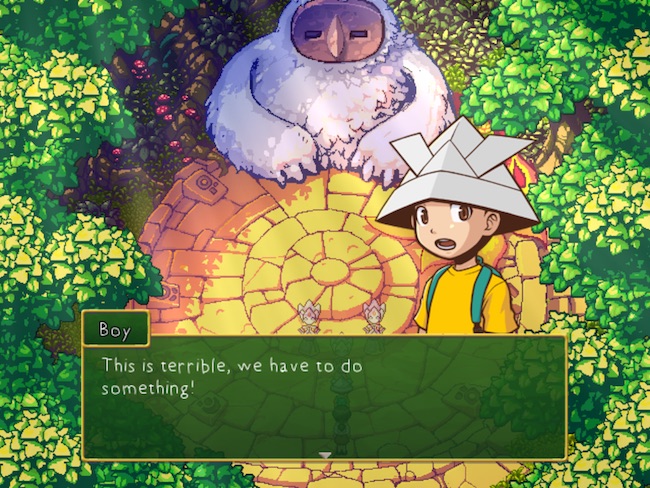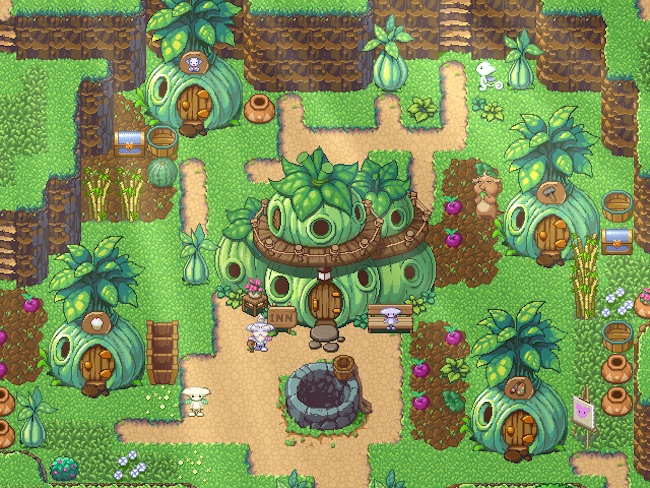
If I were to pinpoint the moment where I first developed an appreciation for indie games, it would almost certainly be during my time playing To The Moon. While basic in many of its core components (16-bit graphics, limited gameplay elements, etc.), the game managed to resonate with me on a deeply personal level because of its unconventional themes, superb writing, and outstanding soundtrack. One song in particular which stuck with me was “Everything’s Alright” by Laura Shigihara, who I learned shortly after was working on her own game, Rakuen (also a story-centric adventure game developed in RPG Maker). Needless to say, I was intrigued. I even had the pleasure of interviewing her about it back in 2014, which you can read here. While the game may not have released later that year as originally intended, the concept was so striking I never forgot about it. Three years is a long delay, but it’s finally out now – and in short, I can say it was worth the wait. Rakuen is not without limitations given its engine, but it is a very special game.

Set in Japan, players take on the role of a hospitalised young boy, who, along with his Mum, find a magical doorway to the fantasy world from his favourite book, Rakuen. It’s not explained what is exactly wrong with the boy, just that he wants to seek out the guardian of the forest, Morizora, to make a wish. However, once he locates the guardian, he learns he has fallen into a deep slumber, putting the entire forest in danger, and that the only way he can wake him is by helping his neighbouring patients who each have an avatar in the forest and a story to unravel. If it sounds like this game has the potential to be a bit of a tear-jerker, you’d be right. From a terminally ill little girl who likes to imagine her marbles are little planets she can visit, to an old man with Alzheimer’s disease who can no longer recognise his wife and continually breaks out of his room in order to “continue his work,” each of the characters you’ll interact with have experienced some sort of tragedy during their life, and it’s your task to uncover their story and help them find closure.
The fantasy world of Rakuen is one that’s overflowing with imagination and creativity, not to mention various layers of metaphor. From furry villagers called Leebles to anthropomorphised plants, animals and other mythical creatures, the setting itself feels truly unique. It really lends itself well to the SNES-era aesthetic, too, with a wide variety of beautifully-crafted sprites, avatars, and backdrops which all add a certain nostalgic charm. Having players travelling back and forth between two worlds had the potential to get messy, but player progression has been cleverly gated off to allow just enough room for exploration while also providing a clear and concise path to follow. The game is quite ambitious for an RPG Maker title, clocking in at around eight hours, though I still can’t help but feel torn about certain gameplay implementations (as is often the case with these type of games). As much as everything has been well designed within the limitations of the engine, the adventuring components often end up feeling like you’re running through the motions.

One thing in particular which stood out to me about this game is the whole idea of a young boy adventuring with his Mum. It’s not something I’ve seen before in a game, and I really enjoyed how their relationship played out narratively. While the boy might stand out as the obvious protagonist, it’s important to understand this story is just as much about his Mum. Everywhere you go, she’ll be there with you – after all, her boy is sick enough to be confined to a hospital, so you can only imagine what she must be going through as well. Much like a real-life Mum, too, you can ask for her advice at any time – which a subtle way of ensuring you don’t lose track of where you’re supposed to go. The game itself is relatively straightforward in terms of how it plays and is generally what I’ve come to expect from RPG Maker. There’s no combat, so your primary objective is mostly just to explore in order to find a way forward – often by means of collecting various items or by unlocking tools that will open previously closed off pathways. It’s simple but effective.
Something which bothered me, however, is that you can’t run. I’m not sure why, but the ability to move faster could have significantly improved the pacing. I appreciate that there are a generous number of doorways that allow you to conveniently travel back and forth between the two worlds, but there were still a lot of moments where I knew exactly where I wanted to get to within the immediate area and grew frustrated because the character was just content to plod along everywhere at a snail’s pace. I also wasn’t a big fan of some of the cookie cutter hoops the game makes you jump through in order to progress, such as collecting sticks and fireflies. This sort of game design is common in older adventure titles/RPGs, but I don’t feel it added anything meaningful to this experience other than to artificially extend the playtime. The game easily could have omitted these objectives and been just as successful if it were more tightly focused around its narrative and individual scenarios. I honestly think it could have been an hour or two shorter.

I also think it’s fair to say 16-bit aesthetics have been well and truly saturated by this point – and yet, surprisingly, it doesn’t feel that way here. It’s clear a lot of love and passion went into crafting every little detail of Rakuen. This isn’t a game which relies on nostalgia to draw you into the experience but instead feels like it was built this way because it was the best way to realise the creators’ vision. Much like modern combatless adventure games such as Gone Home, Rakuen encourages you to naturally unravel the story for yourself through exploration rather than spoon-feeding the plot to you in chunks. Its puzzles are also more congruous than in other similar titles because they’re weaved into the gameplay rather than existing as isolated components. All the same, I don’t think it would’ve come together nearly so well had it not been for the incredible soundtrack. This isn’t too surprising given the creators’ musical background, but I really thought the music and vocal tracks added an extra layer of emotion to bring this world and its character to life.
The various backstories you’ll uncover in Rakuen are beautifully written (and often heart-wrenching), but the reason they resonate so strongly is because they’re delivered using metaphor as a means to tackle difficult topics. To give you an example, there is a grumpy old man named Tony who is an in-patient at the hospital. He’s anti-social, rude, and is generally not a nice person to be around. When you encounter his avatar in the fantasy world, however, Tony appears as a big brown bear that lives alone on a small island and often terrorises the villagers who live nearby. It’s not hard to draw parallels between the two characters, and by interacting with his avatar, you’ll be able to learn what you need to help him back in the real world. There’s nothing overly ambiguous about the way Rakuen tells its stories. It’s a fantasy that was intentionally crafted around how a child might be able to comprehend the suffering of others. It’s often been said you can learn a lot by looking through the eyes of a child, and this is an idea Rakuen captures with great success.

Rakuen is a beautiful story about a sick boy and his Mum, who, together, travel to a fantasy world so he can make a wish. However, to do this, he’ll first have to make new friends and help those around him find closure. What makes Rakuen so special is how the game uses a childlike perspective to tackle difficult topics, as well as a fantasy world built upon metaphors for each of its character’s backstories. While I have some minor gripes about certain gameplay components, it’s nothing unexpected from a game built in RPG Maker. For the most part, Rakuen is more congruous than similar titles and really captures the 16-bit aesthetic without relying too heavily on nostalgia. The game is also brought to life with an amazing soundtrack, though it was to be expected given the creators’ prior experience with titles such as To The Moon. If you’re a fan of story-centric adventures and are in the mood to have your emotions put through the wringer, I highly recommend checking out Rakuen. If there is one thing it has an abundance of, it’s heart.











